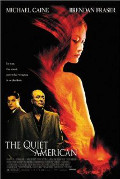
Directed by
Phillip Noyce
118 minutes
Rated M
Reviewed by
Bernard Hemingway

Quiet American, The (2002)
Synopsis: American Aid worker Alden Pyle (Brendan Fraser) arrives in Saigon in 1952 at the height of the struggle between the French and the Vietnamese Communists for control of the country. He befriends Thomas Fowler (Michael Caine), a correspondent for the London Times and falls in love with Fowler's beautiful mistress Phuong (Hai Yen). The personal becomes political, however, as they find themselves caught up in Vietnam’s battle for survival.
The beauty of a novel is that each reader imagines the pictures to go with the words and fills in the spaces between with the words with their own projections. With a filmic transposition we are looking at a single imagined rendition of the original text. Whilst The Quiet American is a visually superb film – the production values are spot-on, creating a convincing image of 1950s Saigon with economy, I could not help but feel that director Noyce, and more probably, writers Christopher Hampton and Robert Schenkkan, had not quite managed to fill the spaces between the words in their reading of Greene’s original text. Somewhat anomalously it is up to the viewer to do that.
The emphasis here is very much on the narrative. The film opens with Caine’s voice-over preamble to the story he is in effect telling us. Although it is a convenient device to make sense of events, the voice-over always has the effect of distancing us from the dramatic action and the characters who drive it. Thus in Noyce’s film we see everything through the eyes of a rather isolated and impassively weary European in his later years. That he is a journalist who is trained to deliver a good story perhaps compounds the sequential patness with which narrative unfolds. Most evident here is the part played by Phoung, Fowler’s mistress, a typical image of the Oriental mistress, gracefully svelte and compliant, who is handed back and forth between Fowler and Pyle without a peep, a kind of willing trophy for the sexually and politically combatant males. We can infer that this is culturally and circumstantially-determined behaviour but it is hard to believe that anyone’s emotions could be transferred as easily as they appear to be here.
Given that Caine’s character is representing himself as well as the other characters, he too is largely mono-dimensional, only briefly losing his self-control when he can no longer abide the smugness of Pyle’s corn-fed ego. This suits Caine’s acting style although I couldn’t get over his Cockney demeanour which was right in Last Orders but seemed out-of-place here. Brendan Fraser, best known hitherto for studio pap such as George of the Jungle, as Pyle, has made a considerable leap in his career with his appearance in this film, but with him, too, I was never completely at ease. Would a CIA operative really be that wholesome? Given his religious commitment, perhaps so.
What carries this film is Greene’s original text (based on his own experiences) and Noyce’s fine directing. Both are sure bets when it comes to story-telling and Noyce, with Rabbit Proof Fence under his belt, has emerged as a director of quality who has applied his skills to a worthy project.
FYI: A version of Greenes' novel had been filmed in 1958 by Joseph L. Mankiewicz with Michael Redgrave and Audoe Murphy in the leads.

Want more about this film?


Want something different?




